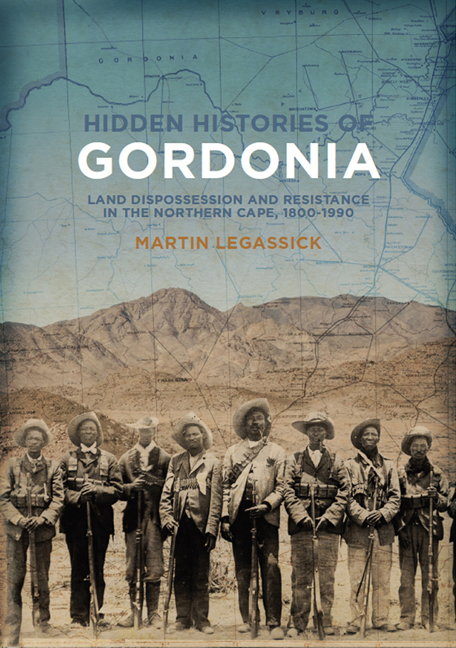Book contents
- Frontmatter
- Dedication
- Contents
- Acknowledgements
- Acronyms and abbreviations
- Illustrations
- Preface
- Chapter 1 The prehistory of Gordonia
- Chapter 2 The Baster settlement of Gordonia and its decline
- Chapter 3 The will of Abraham and Elizabeth September: a struggle for land in Gordonia, 1898–2014
- Chapter 4 From prisoners to exhibits: representations of Bushmen of the northern Cape, 1880–1900
- Chapter 5 South African human remains and the politics of repatriation: reconsidering the legacy of Rudolf Pöch
- Chapter 6 The early history of the brown Afrikaners in Riemvasmaak
- Chapter 7 The battle of Naroegas
- Chapter 8 The Marengo rebellion and Riemvasmaak, 1903–1907
- Chapter 9 The racial division of Gordonia, 1921–1930
- Chapter 10 Keidebees and Blikkies locations, Upington, 1894–1974
- Chapter 11 ‘All my powers have been swallowed by Upington’: the life and times of Alfred Gubula
- References
- Index
Chapter 5 - South African human remains and the politics of repatriation: reconsidering the legacy of Rudolf Pöch
Published online by Cambridge University Press: 20 April 2018
- Frontmatter
- Dedication
- Contents
- Acknowledgements
- Acronyms and abbreviations
- Illustrations
- Preface
- Chapter 1 The prehistory of Gordonia
- Chapter 2 The Baster settlement of Gordonia and its decline
- Chapter 3 The will of Abraham and Elizabeth September: a struggle for land in Gordonia, 1898–2014
- Chapter 4 From prisoners to exhibits: representations of Bushmen of the northern Cape, 1880–1900
- Chapter 5 South African human remains and the politics of repatriation: reconsidering the legacy of Rudolf Pöch
- Chapter 6 The early history of the brown Afrikaners in Riemvasmaak
- Chapter 7 The battle of Naroegas
- Chapter 8 The Marengo rebellion and Riemvasmaak, 1903–1907
- Chapter 9 The racial division of Gordonia, 1921–1930
- Chapter 10 Keidebees and Blikkies locations, Upington, 1894–1974
- Chapter 11 ‘All my powers have been swallowed by Upington’: the life and times of Alfred Gubula
- References
- Index
Summary
I heard that the white men exhumed the bodies of my husband… my stepson and Kouw's wife… cooked their bodies in a pot and carried their bodies away. No one asked my permission to take my relatives’ bodies. I would not grant anyone permission to interfere with my dead relatives’ bodies. After I had heard that the white men had taken my relatives’ bodies and cooked the flesh off their bones, I prepared to leave for the Langberg to report the matter to the Police, but I was told that Bushmen were outside the Law, and that I would get no hearing… Since I heard that my relatives’ bodies were taken and cooked I am sick from sorrow and I will not recover from the shock for a long time. I wept for days.
This was what Old Katje, the wife of a Bushman man living at Kuie Pan in the northern Cape, told police in January 1910, who were gathering evidence on the activities of a Mr Mehnarto, hired by the Austrian anthropologist Dr Rudolf Pöch to acquire Bushman human remains for him. In this case, and in numerous others, Mehnarto had dug up the graves of recently buried Bushmen, without the permission of their relatives. In at least one case he also exported to Austria recently buried corpses. Old Katje's husband's remains, and those of the numerous others, came to be housed in Vienna.
In May 1909 Pöch arrived in Kimberley (from South West Africa and Bechuanaland). He was given red carpet treatment by the South African authorities, from the Prime Minister of the Cape Colony down to magistrates and field-cornets. His purpose was to collect Bushman remains principally for the measurement of skulls in order to understand the ‘racial’ classification of human ‘types’ and their ‘prehuman’ ancestors. This work also sought to prove that people of colour were intellectually and morally inferior to whites, a line of thinking that later fed into Nazi racial thought and ideas of the inherent superiority of ‘Aryans’. In 1915 Pöch wrote that ‘[there] are primitive cultures which are separate from the highly developed ones of Europe…
- Type
- Chapter
- Information
- Hidden Histories of GordoniaLand dispossession and resistance in the Northern Cape, 1800–1990, pp. 147 - 158Publisher: Wits University PressPrint publication year: 2016

